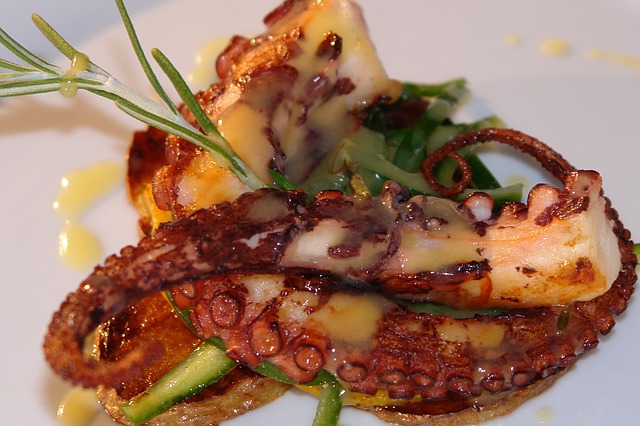
Octopus is a popular dish in many cultures.
It’s served as sushi, grilled, or fried and it can be found in soups and salads.
However, storing the leftover can be a challenge sometimes.
So, can you freeze cooked octopus? The quick answer is yes; you can freeze cooked octopus. This will keep the dish safe for an extended amount of time.
Octopus freezes well but there are mixed opinions on the quality of frozen octopus when thawed.
Some people say that it tastes just as good as fresh octopus while others disagree.
There is a good reason why people do not have the same result. And that reason is the storage process.
If not handled properly during the freezing process, any food not just cooked octopus will suffer.
Needless to say that you need to make sure that you freeze cooked octopus correctly.
Tips on freezing cooked octopus correctly
There are many methods to freezing cooked octopus but the same rules apply; freezing kills bacteria and other organisms that can cause food poisoning.
To do it correctly, here are the steps you can follow:
- Freeze fresh octopus as soon as it has been prepared and cooked.
- Make sure your freezing method respects the freezing temperatures for seafood (at -18 degrees would be ideal).
- Use ice packs or freezing containers to keep the temperature low during freezing to slow down bacterial growth.
- When freezing cooked octopus for the long term, use a food freezing method that is suitable for seafood and freezes it quickly.
Like freezing any perishables, I recommend that you use an airtight container or a resealable plastic bag.
Lastly, make sure that you remove as much air as possible from the bag to prevent freezer burn.
How long can you store cooked octopus in the freezer?
One thing to consider is the shelf life of frozen octopus (as with any food).
It’s important to know how long it’s good for so you don’t waste any.
At freezing temperatures (below -18 degrees), cooked octopus should be safe in the freezer for up to a year compared to about two days at room temperature.
So freezing it is the best method if you want to store your octopus for longer.
Things to remember when freezing cooked octopus
Cooked octopus can be frozen by freezing it at an extremely cold temperature of -18 degrees.
Although cooked octopus can last for up to a year in the freezer, it is best to eat frozen cooked octopus within two months after freezing.
This is because the longer the octopus stays in the freezer, the higher the chance that it will start to lose quality and texture over time.
You can freeze cooked octopus in containers or plastic bags.
If freezing it as a dish, make sure to separate each piece of octopus so that the freezing process will take place more quickly and evenly.
If freezing a whole, uncut octopus (such as for sushi), be careful not to wrap too much in plastic because it can make the freezing process ineffective.
When freezing cooked octopus, it’s best to use freezing products made for freezing seafood and other food products.
Freezing cooked octopus should be done in a way that is suitable for freezing and freezing seafood.
It’s also important to keep the temperature low when freezing it to ensure all bacteria are killed or minimized.
Freezing cooked octopus for tastes better
It’s safe to freeze cooked octopus but some people say that freezing makes the texture tougher and it doesn’t taste as good.
Other people add freezing prolongs the life of the dish so they prefer freezing instead of refrigerating.
If you decide to freeze your octopus, make sure it’s properly frozen to avoid bacteria forming and freezing it as soon after cooking as possible.
If the freezing process was done right, the cooked octopus will taste good or even better when you reheat it.
Is freezing cooked octopus safe?
Yes, freezing cooked octopus is safe. However, freezing doesn’t cool food down instantly so some bacteria may still be present when you put your dish in the freezer.
The freezing method that you use can influence this greatly!
For example, freezing cooked octopus in a freezing container filled with water and ice packs would reach freezing temperature quickly and slows down bacterial growth.
On the other hand, freezing cooked octopus straight into a freezing compartment of your fridge (often not as cold) won’t be very efficient.
Freezing food in freezing containers or on a freezing tray in the freezing compartment of your fridge (depending on how deep the freezing compartment is) will be a better option.
It’s also important to put a label on your dish with the date it was prepared so you know exactly when you should use it.
This way, you won’t accidentally use frozen food a few months after freezing it.
How to thaw frozen cooked octopus?
Thawing frozen cooked octopus is simple and easy too.
Here are the steps to follow:
- Place the freezing container in a bowl of hot water to thaw it quickly. Make sure that there is enough water so that the freezing container isn’t touching it.
- When freezing octopus in a freezing container, separate the freezing container from the freezing compartment of your fridge beforehand and then place it in a bowl of hot water while leaving space between it and the water (so that freezing food isn’t thawing by surrounding water). This will help speed up the thawing process.
Heating cooked octopus after freezing
If you have thawed frozen cooked octopus, it’s very easy to reheat it.
Particularly since octopus is such a soft food and can be eaten cold.
You just need to cook your octopus again or heat it up slowly at 85 degrees (to prevent the texture from changing) and boil it.
Once reached your preferred temperature, serve it and enjoy!
How long will cooked octopus keep in the fridge?
It’s not recommended to keep a cooked octopus in the fridge for long periods of time because freezing is more efficient at preventing bacterial growth.
But if you’re short on freezing space, your cooked octopus should stay fresh in the fridge for about three days.
What else can be done with a frozen cooked octopus?
Frozen cooked octopus can be eaten cold too.
You could also use it in a seafood salad or cut it up as part of your fish dish (like in a crayfish and octopus stir-fry).
You can also mix it with other seafood as part of a seafood salad or put it in a fish soup recipe and make some delicious Cuban octopus stew.
Final Thoughts
In conclusion, freezing cooked octopus is safe.
If freezing cooked octopus, make sure it’s in a freezing container and keep the freezing temperature low while freezing.
That way, freezing will prevent bacterial growth in your dish.
Leaving freezing food in the freezing compartment of your fridge for a few days is fine but freezing at -18 degrees (which freezing containers offer) is the most efficient method to avoid bacteria.
Lastly, to avoid possible issues, do not thaw your frozen cooked octopus on the counter for more than two hours.
If it is left for more than two hours at room temperature, it is better to be discarded than to eat it.
To learn more about freezing foods, check my guide here.

